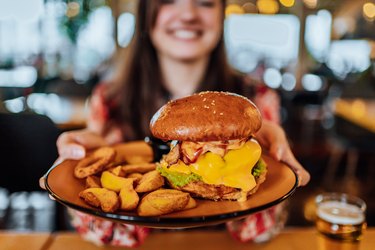
Fat is a crucial nutrient that provides your body with the energy it needs to function. But perhaps you notice symptoms of not digesting fats when you tuck into certain foods. And indeed, there are a number of explanations for why you might be having trouble digesting fat.
Below, learn the common reasons why fatty foods can irritate your stomach, plus how to deal with them.
Video of the Day
Video of the Day
1. Indigestion
Roughly one in four Americans experience indigestion, pain or discomfort in your upper abdomen during or after you finish a meal. In this case, the symptoms of not digesting fat can include feelings of uncomfortable fullness, bloating or nausea, according to the National Institute of Diabetes and Digestive and Kidney Diseases (NIDDK).
And if you feel like you can't eat greasy food anymore without getting a stomachache, there's a reason for that: High-fat foods — like fast food or red meat — are a common trigger for the condition.
Indeed, eating a high-fat diet is linked to increased indigestion, according to an April 2016 review in Advanced Biomedical Research. Another January 2015 study in the Middle East Journal of Digestive Diseases likewise found that high-fat foods (along with spicy and pickled foods) aggravated symptoms.
It's not known exactly why high-fat or greasy meals provoke indigestion.
"Fats take longer to digest than proteins and carbohydrates, so they sit in the stomach for longer," says Lindsey Albenberg, DO, a spokesperson of the American Gastroenterological Association and an attending physician in the Division of Pediatric Gastroenterology, Hepatology and Nutrition at the Children's Hospital of Philadelphia.
In the Advanced Biomedical Research review, researchers also suggest that fat may induce indigestion symptoms via its effect on the hormone cholecystokinin, although "large-scale studies are required to evaluate the impact of dietary factors on symptoms."
Fix it: According to the American College of Gastroenterology, some people find their indigestion improves if they eat several small, low-fat meals throughout the day at a slow pace. Other lifestyle changes that could help ease symptoms include:
- Quitting smoking
- Limiting or avoiding stomach-irritating beverages like coffee, carbonated drinks and alcohol
- Limiting or avoiding anti-inflammatory medications (like aspirin), which can also irritate the stomach lining
- Reducing stress
- Getting enough sleep
If diet and lifestyle changes haven't led to an improvement in your indigestion symptoms, visit your doctor. There are a range of over-the-counter and prescription medications they might recommend, according to the NIDDK.
Warning
Seek medical care right away if your indigestion is accompanied by black tarry stools, bloody vomit or pain in the chest, jaw, neck or arm, per the NIDDK.
2. Acid Reflux
Similarly, gastroesophageal reflux disease (also known as GERD or acid reflux) could be the reason why it feels like you're having problems digesting fat.
GERD occurs when stomach acid washes backwards into your esophagus, according to the Mayo Clinic. Symptoms can include:
- Heartburn
- Regurgitation
- Upper abdominal or chest pain
- Trouble swallowing
- Feeling of a lump in your throat
- Cough
- Laryngitis
- New or worsening asthma
A common trigger for these symptoms? You guessed it: Fatty or fried foods.
Some studies show that high-fat meals can cause the muscle at the base of the esophagus to relax more frequently, says Dr. Albenberg. When this happens, "it is more prone to allow stomach contents to reflux into the esophagus," she says.
Fix it: How you treat GERD depends on the underlying cause of the condition, according to the Mayo Clinic. That said, there are some lifestyle changes you can make to ease or prevent symptoms, including:
- Taking over-the-counter antacids
- Visiting your doctor to see if prescription medications are for you
- Quitting smoking
- Limiting or avoiding stomach-irritating beverages like coffee, carbonated drinks and alcohol
- Limiting or avoiding anti-inflammatory medications (like aspirin), which can also irritate the stomach lining
- Eating smaller meals
- Avoiding eating late at night
- Limiting high-fat foods
3. Fat Malabsorption
If you regularly have diarrhea after eating greasy food, fat malabsorption may be to blame. Fat malabsorption is common, and occurs when your small intestine doesn't absorb all the fat you eat before it passes into your colon, according to the Cleveland Clinic.
Here's what happens when your body can't break down fat:
- Greasy, runny, smelly, light-colored and/or floating stool
- Nausea
- Vomiting
- Gas
- Bloating
- Distention
- Stomach pain after eating greasy food
Fix it: Visit your doctor to confirm that the reason you cannot digest fats is due to malabsorption. A variety of other conditions can lead to malabsorption — including food intolerances, small intestine damage and pancreas, gallbladder and liver diseases — so how you treat your symptoms will depend on the root cause, per the Cleveland Clinic.
4. Gastroparesis
Gastroparesis is a digestive disorder that affects your stomach's ability to empty its contents, according to the NIDDK. The term gastroparesis literally means stomach paralysis, and the name is fitting — if you have the condition, your stomach is unable to contract normally, which means it can't push partially digested food into your small intestine.
Symptoms of not digesting fats due to gastroparesis include:
- Feeling full soon after starting a meal or long after eating a meal
- Nausea
- Vomiting
- Bloating
- Gas and burping
- Upper abdominal pain
- Heartburn
- Poor appetite
It's not always clear what causes the condition — for some, it's a complication from diabetes or an autoimmune disease, but for others the cause is unknown. What is apparent, though, is that eating fatty foods can trigger symptoms, which is why it might feel like you can't digest fat.
Fix it: Visit your doctor for a diagnosis and treatment plan if you show symptoms of the condition. Per the NIDDK, they may recommend following a diet for gastroparesis, which can include:
- Foods and beverages that are low in fat and fiber
- Having several small meals instead of a few big ones
- Eating soft, well-cooked foods
5. Chronic Pancreatitis
Another condition that gives you trouble digesting fat is chronic pancreatitis, which occurs when your pancreas is damaged and can't produce certain enzymes and hormones that help you digest properly, according to Cedars-Sinai.
As a result, your body may not absorb fat and other nutrients. This can lead to symptoms like:
- Pain in the upper belly that spreads into the back
- Pain in the belly that gets worse with alcohol
- Diarrhea or oily stools
- Nausea
- Vomiting
- Severe abdominal pain
- Weight loss
Fix it: Visit your doctor to get a diagnosis. If you do have chronic pancreatitis, your treatment will depend on the severity of your symptoms, per Cedars-Sinai. They may recommend treatments that can help you digest fatty foods, such as:
- Pain medicine
- Digestive enzymes
- Insulin, if you develop diabetes
- Nutritional supplements
- National Institute of Diabetes and Digestive and Kidney Diseases: "Indigestion (Dyspepsia)"
- Middle East Journal of Digestive Diseases: "The Role of Diet in the Management of Non-Ulcer Dyspepsia"
- Advanced Biomedical Research: "Dietary fat intake and functional dyspepsia"
- American College of Gastroenterology: "Dyspepsia"
- Mayo Clinic: "Gastroesophageal reflux disease (GERD)"
- National Institute of Diabetes and Digestive and Kidney Diseases: "Gastroparesis"
- Cleveland Clinic: "Malabsorption"
- Cedars-Sinai: "Chronic Pancreatitis"
Is this an emergency? If you are experiencing serious medical symptoms, please see the National Library of Medicine’s list of signs you need emergency medical attention or call 911.


